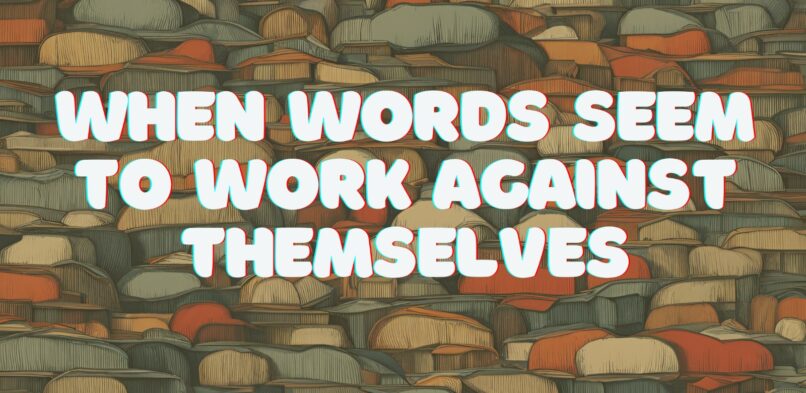When Words Seem to Work Against Themselves

When Words Seem to Work Against Themselves
September 11, 2024 No Comments on When Words Seem to Work Against ThemselvesLanguage is a powerful tool, but there are moments when certain words seem to work against their own meaning, creating confusion or discomfort. Two words that exemplify this phenomenon are underscore and oversight. These terms are often used in specific contexts, but their structure and parts make them capable of meaning something quite the opposite. This contradiction in language not only leads to ambiguity but can also create discomfort for those who analyze language more deeply. Like me. These words give me the heebie-jeebies.
Underscore: Highlighting or Minimizing?
The word underscore is commonly used to mean emphasizing or highlighting something of importance. For instance, when we say, “This report underscores the need for action,” we mean the report emphasizes the need for action. However, the term itself is somewhat counterintuitive.
The prefix under- typically means below, beneath, or less significant (e.g., undermine or underestimate). Pairing it with score (which means to mark or carve) can imply something subtle, almost beneath notice. It raises the question: How can something under a score be meant to draw attention?
This dichotomy creates a cognitive dissonance. The term seems to suggest diminishing or hiding something rather than giving it importance, yet in common usage, it means the opposite.
Oversight: Careful Watching or Careless Neglect?
The word oversight is another prime example. In one context, it refers to careful supervision or monitoring, as in “This committee provides oversight of the project.” Yet, in another context, oversight means an accidental failure to notice something, as in “It was an oversight on my part.”
The prefix over- implies something excessive or overarching. In the case of oversight, it could logically suggest too much supervision or attention. But instead, it swings between two opposing meanings—careful watchfulness and inadvertent negligence. The ambiguity can lead to misunderstandings, depending on the context.
Other Words that Behave Similarly
There are numerous other words in the English language that carry this paradoxical potential:
- Sanction: This can mean both to approve or give permission (e.g., “The law sanctions this action”) and to impose a penalty (e.g., “The country faced sanctions”).
- Dust: To dust can mean to remove dust (e.g., “I dusted the furniture”) or to apply dust (e.g., “I dusted the cake with powdered sugar”).
- Left: While left typically refers to direction or location (the opposite of right), it can also mean something remaining or what has been abandoned (e.g., “He left his keys on the table”).
- Clip: You can clip something to cut it short (e.g., “I clipped the hedge”), or clip something to attach it (e.g., “I clipped the paper together”).
For those like me, who work with language—writers, speakers, communicators—these paradoxes can cause a subtle unease. Words like underscore and oversight are expected to convey clarity, but instead, they introduce ambiguity. They highlight the complexity of language and how the combination of familiar elements can produce meanings far from the literal components of the word.
In a world where clarity is increasingly important, paying attention to words that might undermine the message we’re trying to convey can make all the difference. What words make your head go in a tizzy? Share some examples in the comments.

Leave a comment